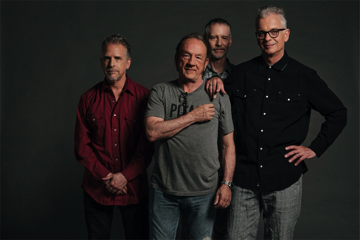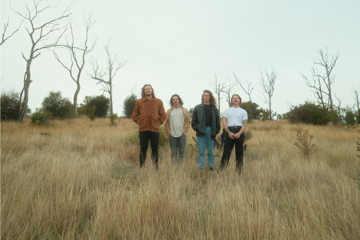Henry Rollins: 'I’m Not An Artist, Just A Crass Opportunist & Reporter From The Edge Of My Own Abyss'
We caught up with Henry Rollins in the lead-up to his first spoken-word Australian tour since 2016.

(Source: Supplied)

Henry Rollins has lived many lives. He’s been a punk - the lead singer of State Of Alert, Black Flag (from 1981 to 1986) and the Rollins Band - an actor in Sons Of Anarchy season two and the final seasons of The Legend Of Korra, an author, columnist, host of a weekly radio show on KCRW and an activist. Who knew a love for Sex Pistols and friendship with Fugazi’s Ian MacKaye could take someone so far?
In 1994, Rollins released the memoir Get In The Van, a collection of journal entries from his time in Black Flag. He’s quite a talker - he transferred sections of the book into a spoken-word format, written and recorded by Rollins, and released as a 2-CD set.
Rollins subsequently won the Grammy award for Best Spoken Word Album; having heard the album, it’s thoroughly deserved. I can’t think of anything of its length in an audio format that’s pulled me in, like Get In The Van.
From his descriptions of the scarier, terrible Black Flag shows to the stories about R.E.M vocalist Michael Stipe, Midge Ure of Ultravox and Nick Cave, Get In The Van is a wholly entertaining journey through five years of mayhem within Black Flag.
To celebrate his upcoming tour, we caught up with the music and entertainment legend to understand what we’re actually in for.
“He [Nick Cave] sure is a great artist. I was lucky to see the Birthday Party once, which is still one of the best shows I ever saw. He’s an extraordinarily intelligent person and also very hard-working. He’s not messing around. I’ve met him several times over the years, and he’s always been cool to me,” Rollins reveals.
The crowds back then were brutal, and looking at today’s hardcore and punk scenes, he hopes “that all the youth beating up on each other part is, for the most part, over with.” He continues to call the aggression that pervaded those early Black Flag shows a “perfect waste of effort, to cause injury to your own, but I understand all that unfocused violence.
“It’s the difference between aggression and hostility. The former is a lot of talk, and the latter is just doing what you used to talk about doing but not actually doing. In the shows I go to, I don’t see any fighting. I think this is great. It’s what I always wanted to see. I think young people in 2023 know who their real enemies are and what they need to do.”
Rollins has been putting on spoken word shows since the 80s, and this June and July, he’s returning to Australia for the massive Good To See You tour; his first tour down under since 2016 marks 34 years since his debut visit to Australian shores.
Rollins and his microphone will touch down in the regional centres of Margaret River, Alice Springs, Cairns, Sunshine Coast, Bendigo, Ballarat, Thirroul, Newcastle and Launceston, and capital cities across the country.
“[Australian audiences] are more energised and enthusiastic [than others],” Rollins says about the three-decade-plus love affair he’s held with this country.
He continues, “They’ve always treated me very well, and they are great to be in front of. If you can remember a great night on a long tour, shows in Australia are like that one night over and over.
“I don’t know if the audiences there are completely different than other places, but they sure are consistent and, again, very into it. If you’re a performer type, you’re happy for a show anywhere, but some places are perhaps more on the same page as you are, and Australia has always struck me as being that way. I always regret it when Australian tours come to an end. I think besides the USA, it’s my other favourite country.”
According to a press release, the Good To See You tour finds Rollins faithfully recounting the events of his life in the brief pre-COVID period since his last visit - when things got even stranger. What could that be alluding to?
The author of over 30 books, including Black Coffee Blues, Get In The Van, Solipsist, Roomanitarian and Broken Summers, Rollins’ latest works Sic and Stay Fantastic!! Vol 3 were released in December and September 2022, respectively.
Rollins’ experiences in music, acting, activism, writing, and spoken word tours have made him view humanity “from different angles,” he says. “I wouldn’t put activism in with the rest of those vocations, especially next to acting. Acting is very, very difficult,” he admits.
Even his Sons Of Anarchy co-stars, “Even someone who’s a ‘natural’ will tell you a lot of effort goes into making it look like there’s no effort being expended. Activism, for me, is an attempt to right wrongs.”
He continues, “The rest of it, at least for me, is different ways of yelling, trying to get something out of me. I don’t think I’m all that dynamic of a person. Just someone who likes to be busy most of the time. I’m not an artist, just a crass opportunist and reporter from the edge of my own abyss.”
That activism he speaks of - his vocal support of gay rights, legalisation of cannabis, anti-war stance and famously, his joining the campaign to free the West Memphis Three, make Rollins one of the most outspoken activists in this day and age.
The West Memphis Three - Damien Echols, Jessie Misskelley Jr and Jason Baldwin were three men convicted for the murders of three boys in Arkansas in 1993. They were imprisoned just months after the crimes took place.
Rollins appeared on the 2002 tribute album Rise Above: 24 Black Flag Songs to Benefit the West Memphis Three, alongside Chuck D and performed the band’s song Rise Above. It was the first time Rollins performed a Black Flag song since 1986.
Rollins says that his stance towards freeing the West Memphis Three (who were ultimately released from prison after submitting an Alford Plea - Echols freed from death row and Misskelley and Baldwin from life imprisonment) came from outrage towards the three not receiving free trials.
“I was outraged at how poorly these men were being treated,” he shares. “Even if they were guilty, which they weren’t, none of them were getting fair trials. It was about liberating innocent people but also giving the state of Arkansas a lesson in how to do right. We won, of course, and Arkansas, for many reasons, isn’t taken seriously at all.”
As he ages, Rollins believes that he sees things more clearly “without the hubris, insecurity and vanity of youth,” which is difficult to argue against.
He adds, “I think it’s great to go through all that, to feel invincible, to look at older people and know that will never happen to you. I think young people should do all that. Age itself will move you onto the next phase. It’s your choice if you want to move with it or move against it. I think there’s an in-between that’s good.” And for people young and old looking to pursue creative outlets, Henry Rollins has some valuable advice for you.
“I would volunteer they [creative people] should feel lucky to have a creative streak in them. This can also be a curse, but I think it’s much better than being normal and being satisfied with normal things,” he shares. “I think in order to push yourself, it’s not a matter of getting over being introverted, that’s always going to be there, and it can take the creative type to some good and true places; it’s a matter of valuing what you want to do.”
He notes that you have to like what you do and find some confidence in it. “You have to like it a little. As it’s been said, all good singers like the sound of their own voice. You don’t have to think you’re great but that what you want to do has value, and it’s worth your time to invest fully.
"What anyone else thinks - that’s almost completely unpredictable, and at the end of the day, who cares? The bottom line is life is short, and if you have something in you to let out, I think you should go for it.”
Tickets to Henry Rollins’ Good To See You Tour are on sale now via Frontier Touring.







